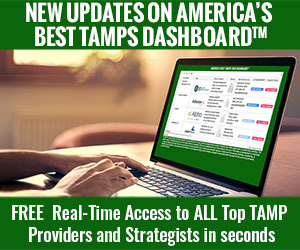
Riskalyze is a fixture in the industry. The Risk Score system is an essential component of many wealth managers' lives.

After all, without the number, matching investments to investors would always be a matter of informed intuition. We'd know more or less what's suitable. We'd know more or less what clients are psychologically equipped to handle.
But if the markets lurch the wrong direction or we failed to read each client's risk tolerance correctly, all that homework evaporates. The number is good.
That's why it was shocking and a little disquieting to see the company go negative on upstart competitor HiddenLevers, which Orion recently bought after a multi-year partnership.
Admittedly, HiddenLevers is a lot smaller than Riskalyze. It isn't as deeply embedded in standard operating procedure.
But Orion is a big platform. Big advisors like Ron Carson and Focus Financial use the HiddenLevers security analysis tools.
The upstart has traction and now has Orion's deep pockets on its side to accelerate its efforts to expand its profile.
Up until last week, I didn't think those efforts would inherently conflict with Riskalyze interests.
I think of HiddenLevers as more of a probability engine that helps build and test portfolios. If you want to know how a given posture will play out in various scenarios, you run these tools.
But it doesn't replace the risk number that drives client relationships from onboarding through IPS and into regular monitoring. Making sure you're hitting the number keeps the compliance team happy and the complaints at bay.
Nobody's going to rip out the number unless there's something comparable to replace it. Advisors are prone to inertia. That's not going to happen for some time.
Indeed, Orion was eager to keep working with Riskalyze. They weren't going to rip its systems out of their platform.
But Riskalyze seems to feel a strategic threat here. Their technology depends on matching the client-facing risk alignment number with the portfolio.
If advisors start using someone else's analytics around the portfolio, the moat around the client gets narrower. And HiddenLevers has those portfolio-facing analytics.
A few months ago, Riskalyze decided the threat was significant enough to go on the attack on various PR channels and via a dedicated website.
They went to the trouble to pick a domain name that directly referenced and belittled HiddenLevers. They bought it. They built it.
It's down now. Because Orion now owns HiddenLevers, picking a fight with the company effectively picked a fight with Orion.
Riskalyze CEO Aaron Klein regrets calling out rivals by name. I don't understand why that was such an attractive idea myself.
To me, the tools were always compatible. Each provided insight that the other didn't.
But if I were only picking one, Riskalyze currently has an iron grip on the client psychology piece, so that's the partner I'd work with.
A confident company would see that it has the upper hand and play its strategic cards accordingly. When you're the senior partner and the market leader (Riskalyze claims 16X the market presence as HiddenLevers), you can afford to build partnerships.
Granted, the HiddenLevers team has a track record for controversy. Maybe they didn't want to be friends.
But unless you're scared of the competition, a leader doesn't flinch. Broadcasting detailed takedowns of a rival's technology isn't the kind of thing a leader does.
Leaders are too busy building their market to worry about crushing startups with footprints that are at best 1/16 (and sometimes as little as 1/100) their size.
All advisors need better risk tools. We all need deeper client profiling systems that plug into the portfolio and validate what would otherwise be nebulous claims of "suitability" and best interest.
In theory, there's enough opportunity in that space to make everyone happy. I believe in cooperative blue oceans. It's how real technology giants function.
Turning that blue ocean red is only a signal that someone is starving.
Riskalyze called HiddenLevers "wildly inaccurate." They called it "irresponsibly wrong."
Orion likes what the new tools bring to the platform. Is HiddenLevers a flawless predictive engine? Of course not.
I didn't think it was marketed as a crystal ball. I see it as a way to model portfolio behavior under various scenarios, but that's it. It's a stress testing engine.
Does it tell me how much stress my clients can take? That's not one of the big marketing points. To get that, I need to stay with my Riskalyze numbers.
Combine those numbers with scenario-based projections and you can do amazing things. Think about factor-based risk profiles that adjust allocations according to each client's mix of hope and fear.
Worried about taxes, no matter what your advisor tells you? That's your pain point. Give me the tools to build and test a portfolio accordingly, and you'll be happy because your investments match your world view.
That's a blue ocean miracle. Instead, we're looking at blood in the water. We still don't know why. I'd love to know why.
Meanwhile, Orion supports all the tools unless some outside catalyst forces their hand. I'm hearing a lot of people exploring HiddenLevers integrations. I'm not hearing people dumping the Riskalyze numbers.



